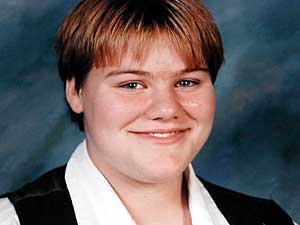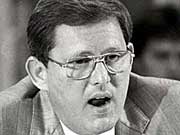The intimidator
January 21, 2004
 |
| Gina Score died at the Plankinton boot camp in July, 1999, after being forced to run two miles on a hot and humid morning. Her family holds Janklow partially responsible for her death. (Photo courtesy of David Score) |
Sioux Falls, S.D. — Plankinton's juvenile detention center stands empty today, quiet except for the swish of dry grass in a chilly wind. A chain-link fence topped with barbed wire circles the long, low buildings. In the 1950s, Plankinton was the state's reform school. Bill Janklow would have served time here in his youth, had he not taken the other choice provided by the judge and joined the Marines.
As governor, Janklow decided to model the detention center on his own past, turning it into a sort of Marine boot camp. Janklow wanted teenagers to learn discipline, physical fitness and teamwork, the very things the Marine Corps had taught him.
 | |||
Janklow believed he knew best, and even said the state could be a better parent to troubled teens than their own mothers and fathers. He transformed the detention center in the late 1990s -- without telling key political leaders.
Pat Haley, head of the Democratic caucus in the South Dakota House at the time, and a member of the corrections committee, says he didn't know about the boot camp until parents and kids started reporting mistreatment.
"They were four-pointing teenage girls, naked, on cement pads in isolation cells at Plankinton. Handcuffing (all four limbs) to little rebar loops that had been fashioned into cement pads," Haley says.
A judge sent Gina Score, 14, to Plankinton in July 1999 for shoplifting. David Score says his daughter thought the camp might be a good idea.
"She got there on a Friday, entered boot camp on Monday and died on Wednesday," Score says.
 | |||
Gina Score collapsed after being forced to run two miles on a hot and humid July morning. Boot camp counselors refused her help. They said she was faking. Gina sat under a tree for several hours before someone called an ambulance.
"The doctor flushed her with cold fluids, and her temperature was still over 108 degrees. And that was one and a half hours later. So basically, she cooked to death," says her father David.
There was an outcry. Janklow closed the boot camp in 2000, citing management problems. David Score says Janklow shares the blame for his daughter's death. He says the governor hand-picked the camp's director. He says the counselors were not trained to deal with medical emergencies.
The Scores sued over their daughter's death. They settled with the state and a hospital for $1.25 million. Two boot camp employees were charged, and both were acquitted.
Former legislator Pat Haley says Janklow's reaction to Gina Score's death was typical. He went on the attack. He tried to discredit kids and parents who spoke out on camp abuse. When Haley confronted Janklow during a phone conversation, Janklow ripped into him, too.
 | |||
"His anger can be overwhelming. The words were one after another after another -- it was like an assault," Haley recalls. "He would always drop back at some point and kind of cajole a little bit. And about the time you would begin to feel like you were back on your feet, then he'd come at you again."
Haley said Janklow threatened to destroy his career.
It wasn't just opponents who were afraid of Wild Bill Janklow's larger-than-life personality. Minnesota Public Radio contacted dozens of people, supporters as well as opponents, to ask about Janklow. Most refused to be interviewed. Bill Janklow himself declined an interview request.
One person who did speak is journalist Jim Carrier. Carrier was the executive editor of the Rapid City Journal in the early 1980s, when he tangled with Gov. Janklow. Janklow had sent state troopers to a bankrupt rancher's house to repossess livestock and machinery. Janklow worried there might be a gun fight. Carrier, as a reporter, heard about it and was on the phone with the rancher when the troopers arrived.
When Janklow found out about the call, he called Carrier and accused him of tipping the rancher off and deliberately endangering the state troopers. Carrier says he told Janklow that the rancher knew, before his call, that the law was on its way.
 | |||
"I refused to back down in my conversation with the governor. Within a couple of hours he had gotten a conference call with my publisher, and proceeded to repeat the accusations against me in a three-way conversation with my publisher," Carrier recalls. "When that finished I got the paper out and reported the story, and when I came in Monday, I was fired."
Though few people will publicly accuse Janklow of intimidation, when the tape recorder was off many gave examples of it. They acknowledged Janklow rarely admitted he was wrong. They believed he placed himself above the law.
During the 1998 race for governor, Democrat Bernie Hunhoff accused Janklow of corruption. Hunhoff's campaign manager Bret Healy runs down a list of specific allegations.
"He also was able to get a $250,000 loan when he didn't have the collateral. ... And it just so happened the banker he had borrowed the money from, he had appointed to the state banking commission," Healy says. "In other states, in other venues, we'd call that corruption. And frankly, that's what we should call it in South Dakota. In 1998 it was called just politics."
|
News Headlines
|
Related Subjects
|

